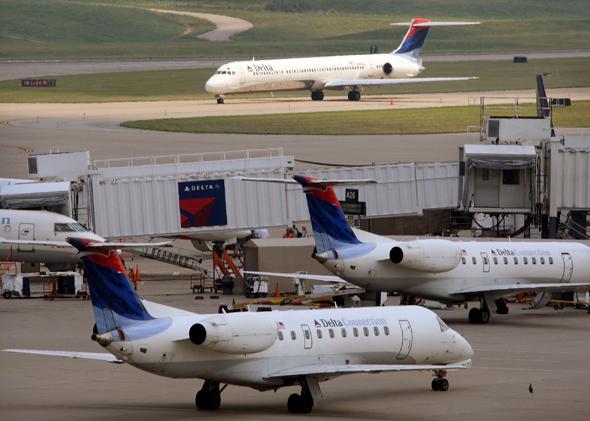Americans making the drive to grandma’s house this Christmas will arrive with a little more cash in their wallets than they might have expected. Those traveling by air won’t be so lucky.
The average price for a gallon of unleaded gasoline was hovering around $2.50 on Wednesday, down roughly 22 percent from this time last year. U.S. airlines have been getting even more of a bargain, with the price of jet fuel falling by 32 percent during that same period. The difference, though, is that Americans aren’t seeing any relief when they book their tickets home for the holidays. The average domestic airfare has actually increased 3 percent—or about $10—this year, according to government figures and independent estimates.
Fuel accounts for anywhere between a third and half of airlines’ operating costs. If the price of jet fuel has plummeted, then why haven’t airfares fallen along with it?
The short answer is that profit-seeking airlines have no reason to charge less. Thanks to a string of megamergers—Continental with United, Northwest with Delta, AirTran with Southwest, and, most recently, US Airways with American—airlines now have less competition, and consumers have fewer choices. Those four major U.S. airlines now account for roughly 80 percent of domestic capacity. Less than a decade ago, 80 percent of domestic capacity was spread among 11 carriers.
Demand, meanwhile, has grown—this despite passengers being nickeled, dimed, and $20-billed for everything from midflight snacks to mandatory bag-checking. Airlines are now selling a record 85.1 percent of available seats on domestic flights. That’s good for the carriers’ bottom lines. North American airlines expect their profits to grow from $11.9 billion this year to $13.2 billion next year, and Southwest and American both just had record quarters. It’s bad, however, for anyone looking for a cheap flight, as declining fuel prices haven’t led airlines to pass those savings along to customers.
That lack of largesse has Sen. Chuck Schumer calling for the Department of Justice and Department of Transportation to investigate the industry. “At a time when the cost of fuel is plummeting and profits are rising, it is curious and confounding that ticket prices are sky-high and defying economic gravity,” the New York Democrat said in a statement this week. “I’m urging the feds to step in and do a price investigation on behalf of consumers who must buy holiday travel tickets that can break the bank.”
In crafting this populist message, Schumer is, not surprisingly, oversimplifying the issues at play here. It is not realistic to expect airfares to immediately rise and fall in tandem with fuel costs. Unlike drivers, who pay today for the gas they’re using that very day, airlines sign long-term fuel contracts as a way of hedging against an unpredictable market. That means much of the jet fuel that carriers are burning now was purchased months ago, when prices were higher. Of course, those long-term contracts cut both ways—that’s the point of a hedge, after all. Carriers are flying on slightly more expensive fuel today, but the contracts they’re signing now mean they’ll be flying on less expensive fuel in the future.
Does that mean the carriers will reduce airfares in a few months’ time, even if fuel costs rise? Maybe not—and that’s why it’s fair to criticize them.
The International Air Transport Association, the industry’s largest trade group, suggested last week that the average ticket price could fall by as much as 5 percent in 2015 if current trends continue—but even then, the group says, consumers won’t get any relief until next summer at the earliest. Only time will tell if the airlines deliver on that open-ended promise. The group’s U.S. counterpart, Airlines for America, meanwhile, is offering no such assurances even in a hypothetical cheap-fuel future. As American Airlines President Scott Kirby recently told investors, “In a strong demand environment, we don’t plan to go off and just proactively cut fares.”
Airlines aren’t the only corporations whose response to fuel price fluctuations lines up neatly with their quest for profits. When the wholesale price of gas jumps, for instance, your local gas station scrambles to hike its prices. When the wholesale price falls, they’re not in such a hurry. A 2010 study by the Federal Trade Commission found that retailers shift prices four times more quickly when the wholesale price of gas climbs than when it falls. Given that airlines face far less competition than your corner gas station, they have the luxury of reacting even faster when it serves them and slower when it doesn’t.
As an added wrinkle, those low-and-getting-lower gas prices may actually help airlines charge more for flights. Economists estimate that the average American household could save as much as $750 annually on gas—extra cash that carriers are hoping consumers turn around and spend on air travel.
Despite Schumer’s calls for a federal investigation, don’t expect Congress to come to the rescue. As the New York Times’ editorial board pointed out this week, airlines are using some of their newfound profits to expand their political power. Earlier this year, the industry began lobbying lawmakers to revoke a rule that forces carriers to advertise airfares that include taxes, as opposed to pretax prices that would be more enticing. The GOP-controlled House signed off on that change this summer. The measure stalled in the Senate, but the proposal is expected to get a second life once Republicans take over in the upper chamber next year.
If airlines ultimately get their way, then the cheap airfares Americans are most likely to see next year will be ones that are literally too good to be true.
